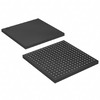Manufacturer Part Number
XC2S200-5FGG256C
Manufacturer
Xilinx
Introduction
The XC2S200-5FGG256C is a high-performance Embedded FPGA from Xilinx's Spartan®-II series, tailored for applications requiring high logic processing capabilities and flexible I/O configurations.
Product Features and Performance
High logic processing with 200,000 logic gates
5292 logic elements/cells for adaptable logic synthesis
1176 LABs/CLBs for efficient logic distribution
57,344 total RAM bits for intensive data management
Supports 176 I/O pins for versatile connectivity
Operates on a supply voltage of 2.375V to 2.625V for power efficiency
Engineered for surface mount technology to save board space
Product Advantages
Advanced logic capacity suitable for complex processing needs
High RAM density supports substantial data handling applications
Low power consumption enhances system efficiency
Wide range of I/O adaptability boosts interfacing capabilities
Surface mount design fits compactly into various systems
Key Technical Parameters
Number of Gates: 200,000
Supply Voltage: 2.375V to 2.625V
Operating Temperature: 0°C to 85°C
Package: 256-BGA
Mounting Type: Surface Mount
Quality and Safety Features
Designed to meet rigorous quality standards of Xilinx FPGAs
Offers reliable performance under specified operating temperatures
Compatibility
Compatible with surface mount technology for PCB integration
Supports a range of digital signalling for versatile application use
Application Areas
Telecommunications
Automotive electronics
Industrial controls
Consumer electronics
Product Lifecycle
Currently in the Last Time Buy phase
Future upgrades or replacement products should be considered for new designs
Several Key Reasons to Choose This Product
Optimal choice for projects requiring high logic processing capabilities
Future-proof your design with ample logic elements and RAM
Low power consumption for energy-efficient designs
Wide temperature range ensures reliability in diverse environments
Surface mount packaging simplifies PCB design and manufacturing processes



 XC2S200-5FG456CAMDIC FPGA 284 I/O 456FBGA
XC2S200-5FG456CAMDIC FPGA 284 I/O 456FBGA